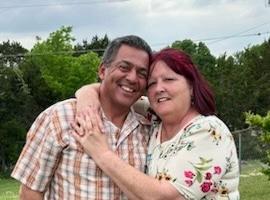The Unseen Struggles of a Caregiver
Being a caregiver is a journey that is both physically and emotionally demanding, filled with challenges that most people will never fully understand. When my spouse was diagnosed with Complex Regional Pain Syndrome (CRPS), I had no idea how much our lives would change. At the beginning, everything was overwhelming—understanding her pain levels, finding the right doctors, and navigating a medical system that seemed unprepared for such a complex condition.
Thirty years ago, there was barely any information on CRPS. Medical journals only dedicated a single paragraph to it, and many doctors dismissed my wife’s suffering, saying it was “all in her head.” That was one of the hardest things to accept—watching her struggle while professionals, who were supposed to help, refused to acknowledge the reality of her condition. Over time, we found specialists who understood, but it was never easy. The battle didn’t stop at diagnosis; it extended into every aspect of our lives.
One of the biggest fights was getting my wife the disability benefits she deserved. When CRPS took away her ability to work, we had to jump through endless hoops to prove she was truly disabled. Even after approval, our struggles with insurance companies never ended. At one point, our coverage was canceled because we had “used it too much.” As if needing medical care was somehow a crime.
Explaining my wife’s illness to friends and family became another exhausting task. They would nod and act like they understood, but their words and actions often proved otherwise. The frustration of trying to make others grasp something so complex and invisible was draining. At times, it felt like we were fighting on all fronts—against the medical community, the insurance system, and even the misconceptions of those closest to us.
Being a caregiver means living with constant uncertainty. Every day is unpredictable, from long drives to doctor’s appointments to unexpected hours spent in the ER. I constantly ask myself: Am I doing enough? Is this reaction pain-related, or did I make a mistake? Planning anything is nearly impossible because I never know what my wife will be able to tolerate. Even something as simple as going to the store or a movie theater becomes a source of anxiety—will someone accidentally bump into her legs, triggering excruciating pain? Will a sudden cramp force us to leave early? These are worries I carry every single day.
One of the few bright spots in my wife’s life is social media, where she connects with other CRPS patients. It helps her feel less alone, and she learns about new treatments and medications. But even this has a dark side. She tells me about people who, overwhelmed by pain, frustration, and the lack of medical understanding, have given up completely. Some have even taken their own lives. Those stories haunt me. I pray that my wife never reaches that point, but the fear lingers in the back of my mind.
Being a caregiver is not easy. It requires putting my own feelings aside to focus on my wife’s needs, even when I’m exhausted or frustrated. It’s a role that is both a privilege and a burden—one that I never expected but have accepted because it’s what must be done. Nearly 30 years later, we are still fighting battles with insurance, still struggling to make others understand, and still adapting to the challenges CRPS brings into our lives. But through it all, the most important thing remains unchanged: I will always be here for my wife. Because in the end, love and perseverance are the only constants in this unpredictable journey.

